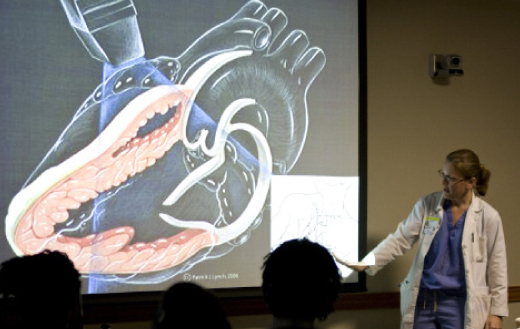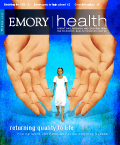Building a science pipeline

Stimulating science interest early
The high school seniors gathered in the cardiology unit at Grady Memorial Hospital got a close-up, hands-on lesson about their own hearts one afternoon this past fall. Led by Emory cardiologist and Grady cardiology chief Allen Dollar, a group of sonographers showed how echocardiography worked using several of the students as patients. “So, is this the same as ultrasound for a baby?” asked one student.
| In this section |
The class is part of the Pipeline program, started four years ago by two Emory medical students, Sam Funt and Zwade Marshall, at South Atlanta School of Health and Medical Sciences. School officials credit Pipeline with stimulating interest in health science careers at South Atlanta as well as bolstering attendance and academic performance.
Beginning with a single class, the program has expanded to include classes for sophomores, juniors, and seniors. Each grade level has access to a distinct curriculum with a classroom component, one-on-one mentoring by Emory undergraduates, and hands-on demonstrations. Sophomores explore infectious diseases and HIV/AIDS. Juniors study neuroscience. And seniors—who get help with college application coaching—focus on cardiology and community outreach, culminating in a health fair that they organize at their school.
Pipeline participant Alexis Height, a junior, likes the interactive nature of the program. “I think we learn more from each other,” she says.
Edward Anderson, a teacher who coordinates the program at South Atlanta High, reports an increase in the confidence and level of excitement among students about science. “We see more leadership, not just in class but in the whole building,” he says. “Students are picking up the torch and running with it. I believe they will be future leaders and have a great impact.”
Just how much impact the program is having will be verified soon by students at Emory’s Rollins School of Public Health. They are in the process of quantifying the effect of Pipeline on attendance, grades, and test scores.
The first group to benefit from all three years in the Pipeline program has graduated recently, with all participants going on to enroll in a college or university. Several participants are studying in Emory’s Preparatory Research and Education Program (PREP) and Research Internships in Science and Engineering (RISE) program, and at least one South Atlanta student was awarded a scholarship to Emory. Another Pipeline alumna, Alyssia Clore, earned a Gates Millennium scholarship, which is enabling her to attend Spelman College.
“When you see kids who are the first in their families to go to college, or that didn’t think they were smart enough to go, those are the eye-openers that make this program worthwhile for me,” Anderson says. —Quinn Eastman


